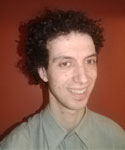Award Sponsored by Mercedes-Benz Research & Development
The ECS Battery Division Student Research Award recognizes promising young engineers and scientists in the field of electrochemical power sources and encourages recipients to initiate or continue careers in the field. Mercedes-Benz Research & Development generously sponsors the award.
Congratulations to the 2020 award winners, Matthias Künzel of the Karlsruhe Institute of Technology, and Julian Self of the University of California Berkeley.
 Matthias Künzel’s PhD research at the Helmholtz-Institute Ulm and Karlsruhe Institute of Technology, Germany, supervised by Prof. Stefano Passerini, explores sustainable high-performance lithium ion batteries with particular focus on cobalt-free positive electrode materials and their aqueous processing.
Matthias Künzel’s PhD research at the Helmholtz-Institute Ulm and Karlsruhe Institute of Technology, Germany, supervised by Prof. Stefano Passerini, explores sustainable high-performance lithium ion batteries with particular focus on cobalt-free positive electrode materials and their aqueous processing.
Künzel completed his BSc (2014) and MSc (2016) in molecular nanoscience at the Friedrich-Alexander University, Germany. A graduate research stay at the University of Wollongong (UOW), Australia, was funded through the ISAP program of the German Academic Exchange Service. At UOW, Künzel investigated impedance-based strain sensors made from conducting tough hydrogels. He completed his MSc thesis at the Robert Bosch Research Campus in Renningen, Germany, where he studied electrochemical pre-lithiation of silicon anodes for lithium ion batteries.
As an early career researcher, Künzel demonstrated the feasibility of aqueous electrode processing of water-sensitive high-voltage cathode materials, and introduced concepts and strategies for their successful implementation. A main outcome of his research is the complementary protection of positive active material with simultaneous crosslinking of the binder through selected processing additives leading to significantly enhanced performance of sustainable 5V lithium ion batteries. Künzel’s work has been published in ChemSusChem, ACS Applied Energy Materials, and Materials Today. He contributed to 14 peer-reviewed publications and co-authored one European patent.
 Julian Self is a PhD candidate at the University of California Berkeley, US, working with Prof. Kristin Persson on electrochemical research. He is Graduate Student Research Assistant in the Applied Energy Materials Group at the Lawrence Berkeley National Laboratory. Self completed his MSc under the supervision of Dr. Jeff Dahn at Dalhousie University, Canada. There he studied in situ gas formation in Li-ion pouch cells during cycling, as well as electrolyte decomposition and electrode-interphase formation.
Julian Self is a PhD candidate at the University of California Berkeley, US, working with Prof. Kristin Persson on electrochemical research. He is Graduate Student Research Assistant in the Applied Energy Materials Group at the Lawrence Berkeley National Laboratory. Self completed his MSc under the supervision of Dr. Jeff Dahn at Dalhousie University, Canada. There he studied in situ gas formation in Li-ion pouch cells during cycling, as well as electrolyte decomposition and electrode-interphase formation.
Self’s PhD thesis research focuses on computation, modelling, and simulation work in collaboration with experimental teams. He works to understand bulk, transport, and interfacial properties of state of the art and next generation electrolytes, both Li+ based and multivalent, and how these directly tie into battery performance. One of his current research topics is interionic interactions in multivalent electrolytes. The charting of salt interactions and speciation in such electrolytes is part of a larger effort to understand bulk properties as well as charge delivery and interphase formation in multivalent batteries. Systems of interest include magnesium and calcium salts in ether-based solvents. Self uses computational and theoretical tools in conjunction with collaborators using experimental techniques such as dielectric relaxation spectroscopy. For example, Self uncovered a universal redissociation mechanism which was found to explain observed anomalous transport behavior in multivalent low-permittivity solvent systems. The co-author of 29 articles, his research has been published in the Journal of The Electrochemical Society, The Journal of Physical Chemistry Letters 11, Journal of Physical Chemistry, and Journal of Power Sources.

